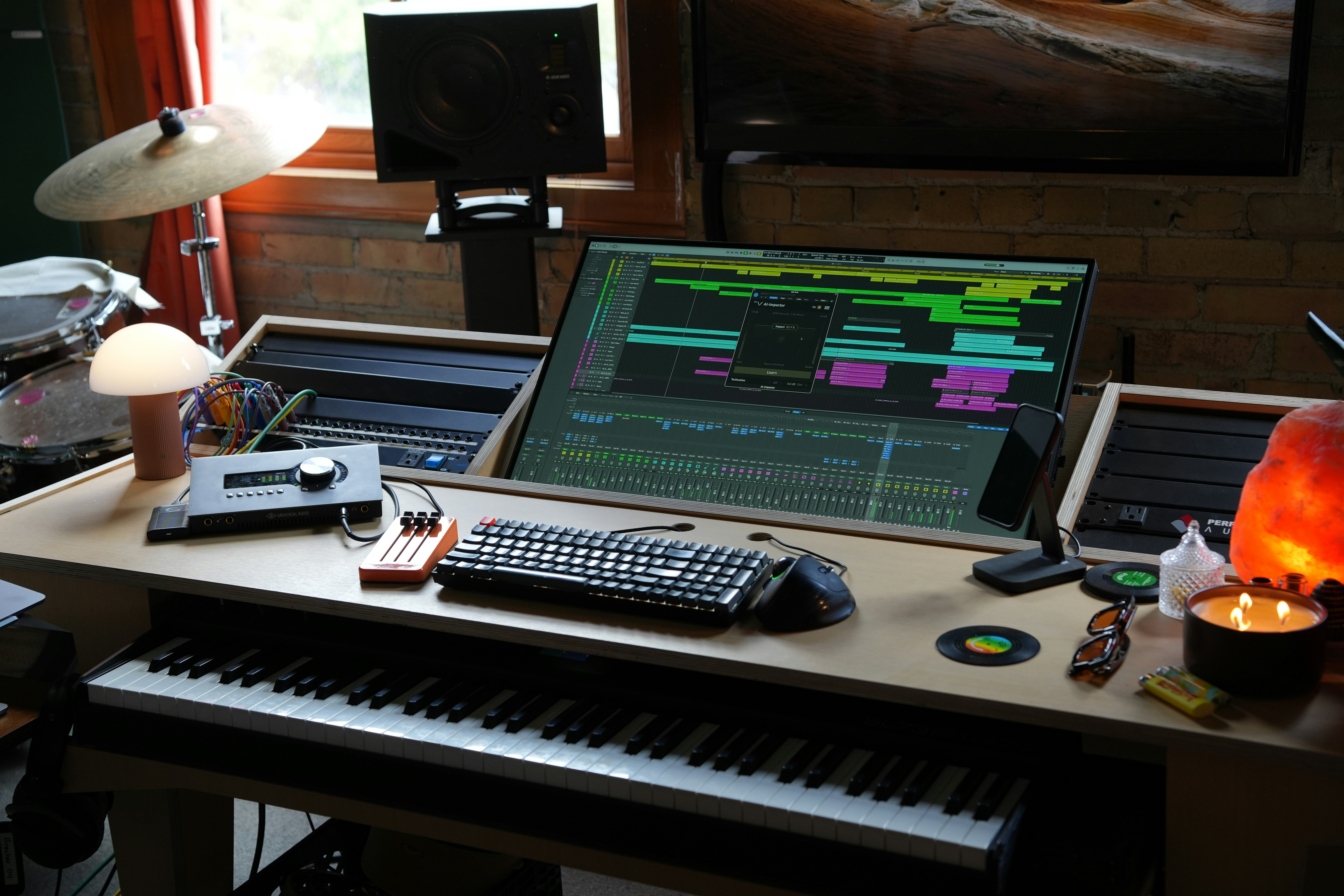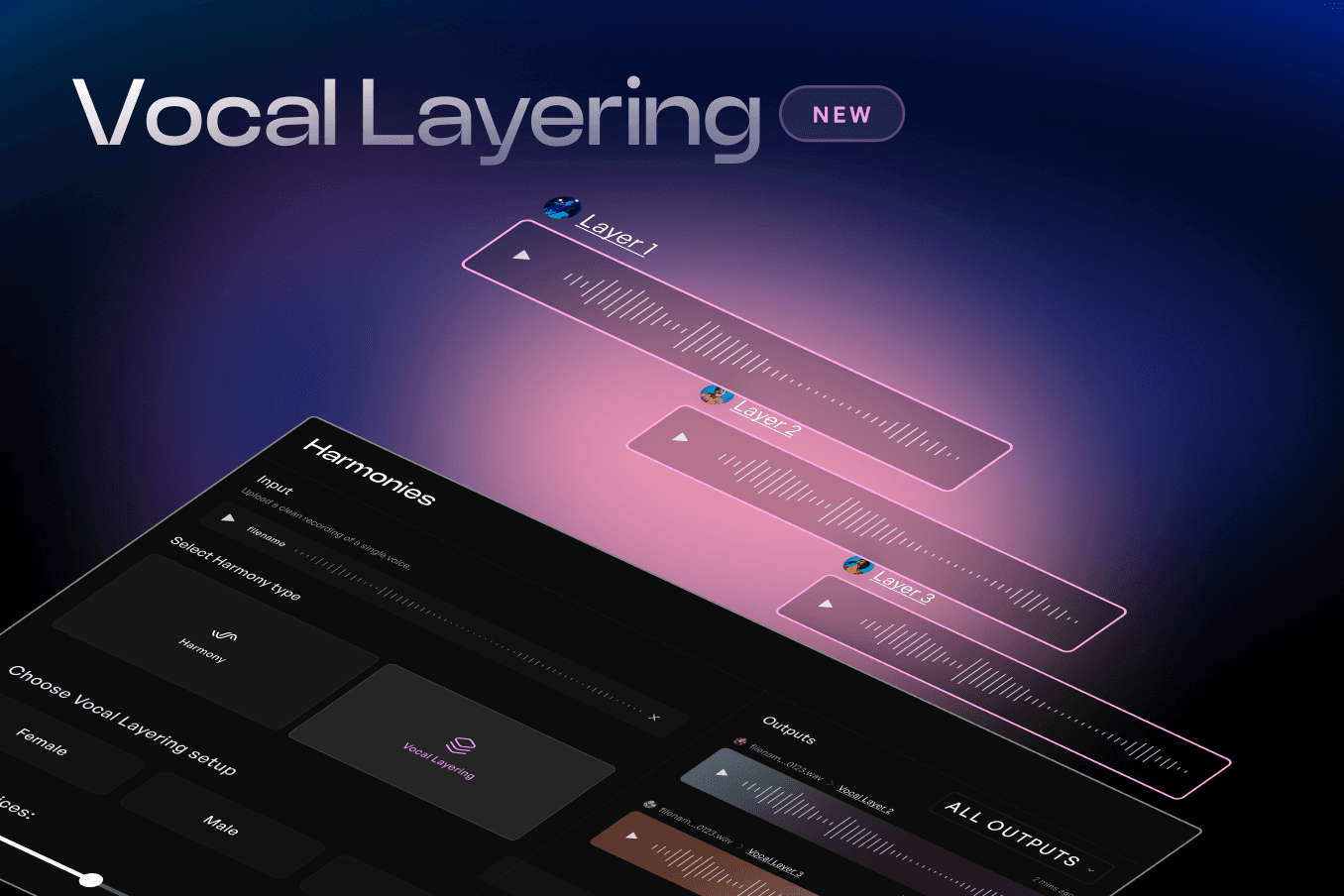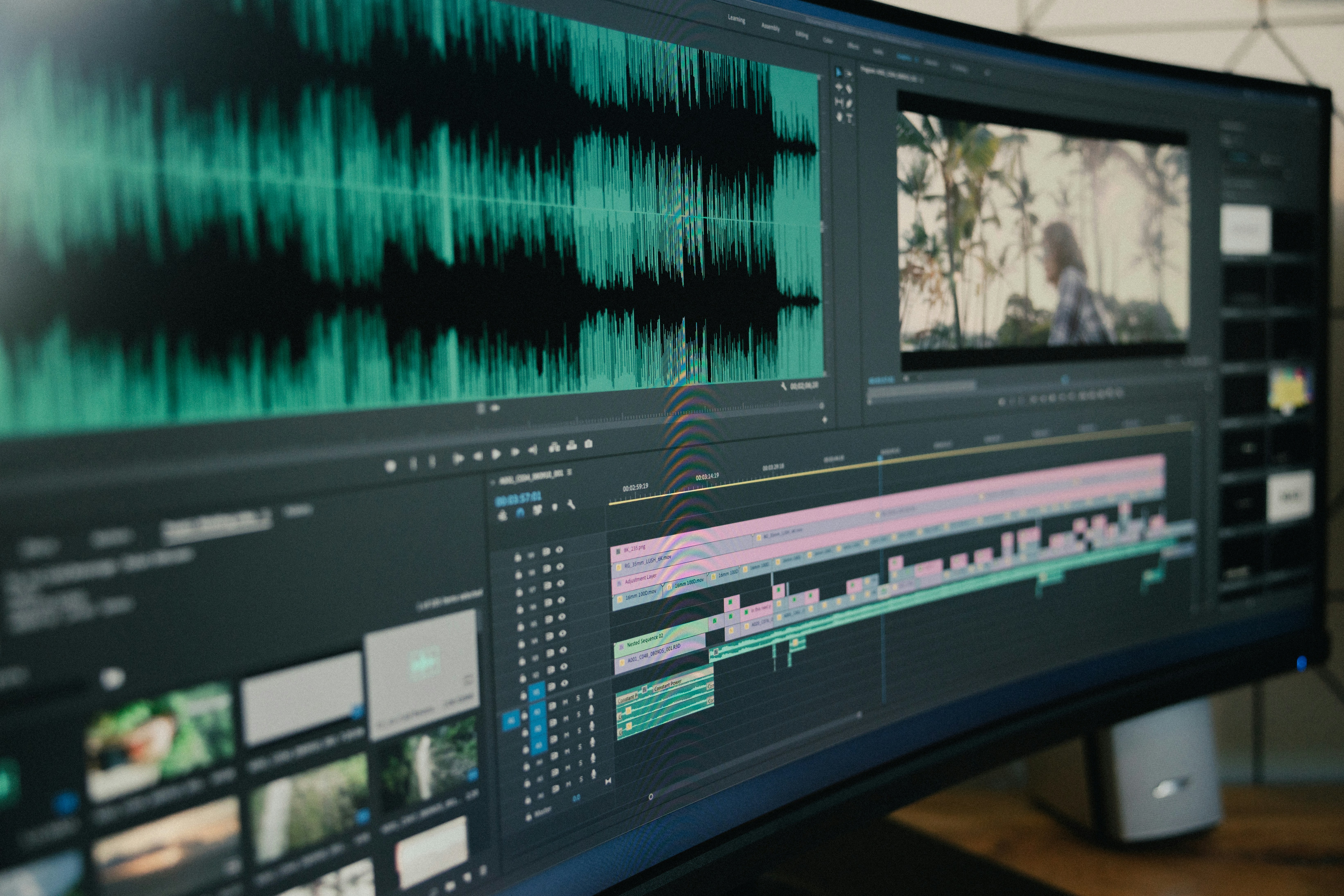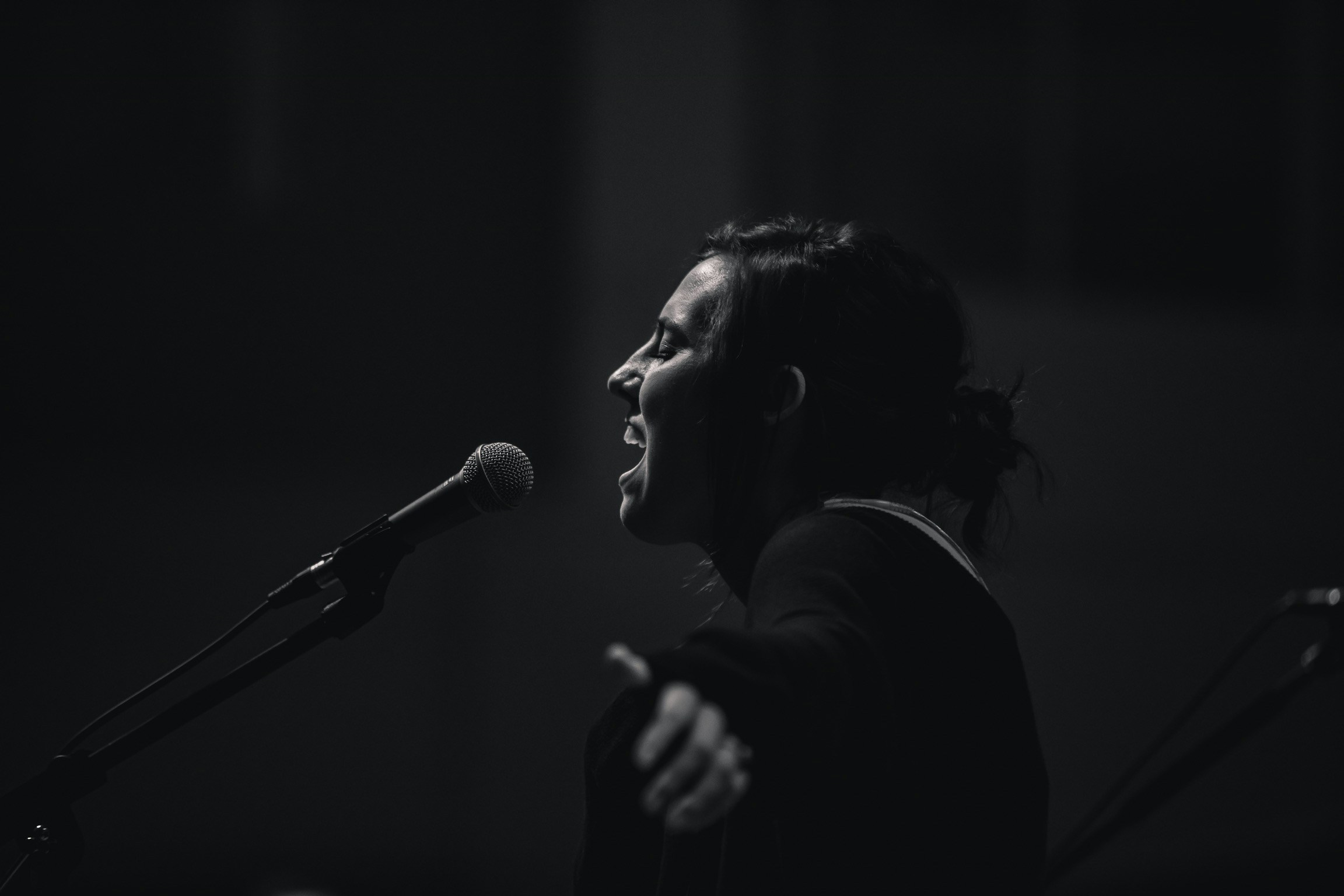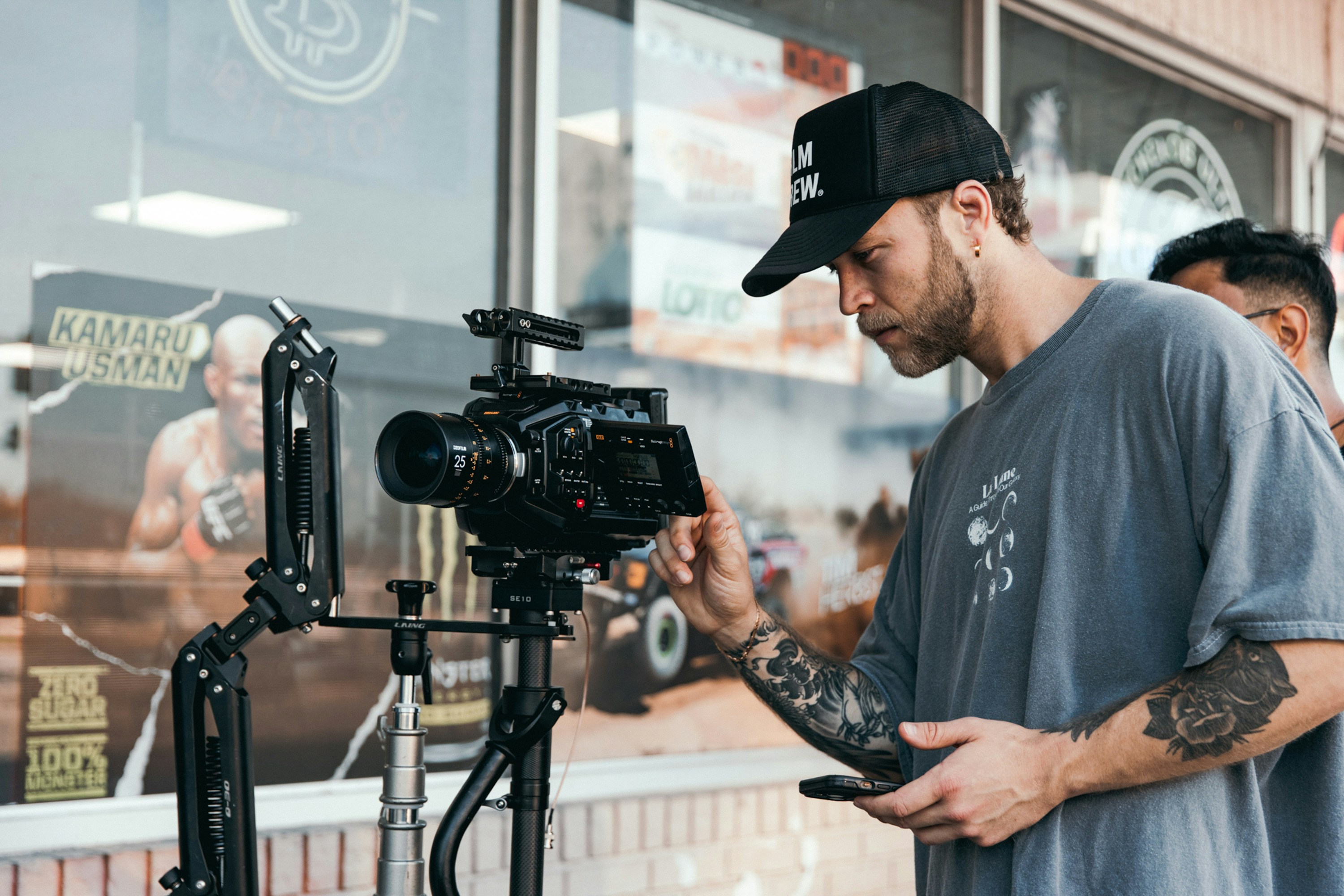Beyond Pitch Correction: Leveling Up Your Vocals With AI
Written by
Published on
September 18, 2024
Still think Pitch Correction is the cutting edge of vocal production technology? Hate to break it to you but… you’re late.
Today’s tools are not just more powerful tools in your arsenal, more capable of fixing issues and bad takes. With artificial intelligence built in, they’re full-blown creative tools that make you a more inventive, innovative producer. These advancements in AI not only enhance musical performance but also have significant applications in fields such as voice rehabilitation, showcasing the potential of assistive technologies. And the results sound so good, you’d never know it’s AI.
From voice synthesis to voice conversion to isolation, let’s explore all the ways AI can level up your vocals.
The Limitations of Pitch Correction
While Autotune™, the iconic software by Antares, and pitch correction tools have undeniably revolutionized the music industry, they come with their own set of limitations. An over-reliance on the Autotune™ tool can result in an unnatural, robotic sound that strips the human voice of its emotional depth. This synthetic quality can detract from the authenticity of a vocal performance, making it sound overly processed. Additionally, Autotune™ struggles with complex vocal arrangements or harmonies, often requiring manual editing and fine-tuning to achieve the desired pitch.
Pitch correction tools may also introduce artifacts or distortions into the audio, especially if the original voice recording is of poor quality. These artifacts can lead to an “over-corrected” sound that diminishes the overall quality of the music. Furthermore, effectively using Autotune™ and pitch correction tools demands a solid understanding of music theory and vocal production techniques, which can be a barrier for some users.
The Power of AI in Vocal Processing
Artificial intelligence is transforming vocal processing, opening up new possibilities for music producers, vocalists, and music enthusiasts alike. AI-powered vocal conversion tools, such as Kits AI, can convert your vocals holistically, allowing for more natural and expressive vocal performances.
The integration of AI in vocal creation is revolutionizing the music industry, making it possible for music producers to create professional-sounding vocal tracks without the need for expensive recording studios or highly skilled vocalists. This democratization of music production is empowering a new generation of creators to explore their musical potential and push the boundaries of what is possible.
Voice Cloning and Pitch Correction
Voice synthesis is the creation of entirely new voices through the use of technology. Voice synthesis technology predates artificial intelligence, but the results today are far more human, versatile, and dynamic thanks to advances in machine learning. This technology empowers users to create music that reflects their unique style and artistic identity, allowing them to produce vocals that truly represent the voice they want for their track.
The most famous example of voice synthesis is actually a singer herself: Hatsune Miku, the ultra-popular virtual Japanese idol. First launched in 2007, Hatsune Miku has blurred the lines between real and artificial, selling hundreds of thousands of records, performing at Coachella, and collaborating with Pharell, Big Boi, and SOPHIE, among many others. But she’s not real.
Behind Hatsune Miku is Vocaloid, the leading voice synthesis software. Launched by Yamaha in 2004, the software generates new singing based on inputted lyrics and melodies using “concatenative synthesis.” Hatsune Miku is just one of many anthropomorphic voices packaged with Vocaloid, including English, Korean, and Chinese singers alongside Japanese. The latest iteration, Vocaloid 6, uses proprietary artificial intelligence called VOCALOID:AI for the most expressive, natural singing yet possible.
Kits AI Voice Designer with AI Pitch Correction
Kits AI offers a similar tool in its Voice Designer, which showcases the tool's capabilities by allowing you to create completely new voices with AI. First, select a gender and genre. Then, using a unique triangular interface, balance the breath, power, and warmth of the voice until it sounds perfect. Adjust the randomness slider to introduce more human-like artifacts to the final result.
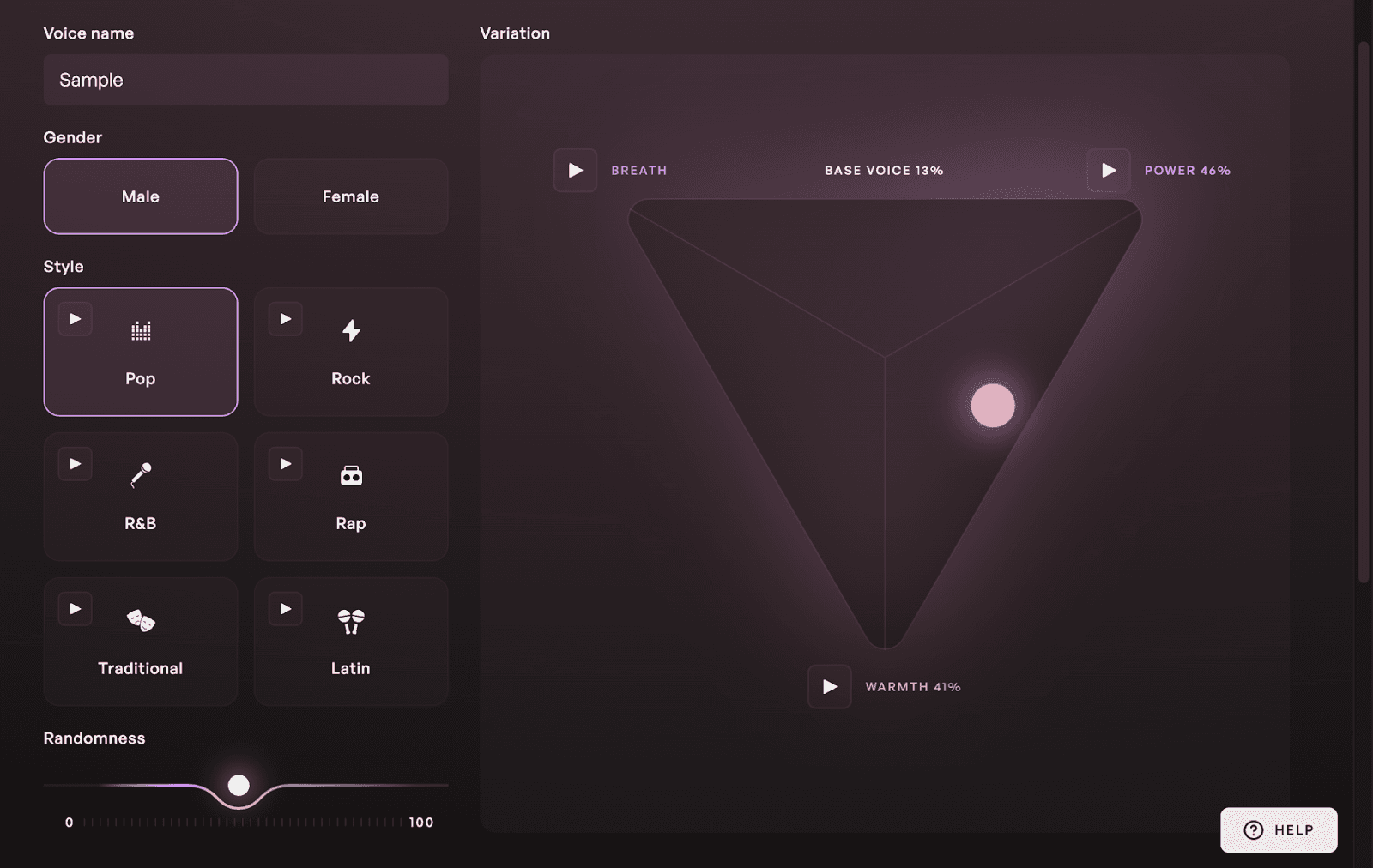
On top of completely AI-generated voices, Kits AI and Vocaloid have completely different workflows. Instead of entering melodies and lyrics into Vocaloid with a piano roll, you use a Voice Designer voice by converting an existing recording. (More on vocal conversion in a second.)
Simply sing the part you want, upload it to Kits AI, then use machine learning to turn it into your new voice. And whether you’re a professional singer or just do it in the shower, Kits AI’s advanced pitch correction will make it sound great. Plus, Kits AI is available as a web app for a low monthly subscription instead of a pricey DAW plugin.
Voice Conversion
Voice conversion means taking an existing vocal track, and using artificial intelligence to generate it in another voice. This technology has proliferated rapidly with the rise of accessible AI voice generators, but can introduce some thorny legal issues when used improperly. This technology leverages a generative deep neural network to create more natural-sounding results compared to traditional methods. That’s why Kits AI takes a rigorous approach toward AI ethics and offers only 100% royalty-free voices in its Voice Library.
Maybe the most infamous example of AI voice conversion was created recently, during 2024’s epic Drake vs. Kendrick Lamar feud. In his second diss track, “Taylor Made Freestyle,” Drake used an AI voice generator to create verses from Snoop Dogg and Tupac Shakur. Snoop Dogg responded that he did not record his “verse,” and Tupac’s estate quickly hit Drake with a cease-and-desist and threatened a lawsuit. As a result, the song is no longer available online.
“Taylor Made Freestyle” illustrates the wild possibilities of AI vocal conversion, and is a perfect example of how not to use AI voice generators.
Kits AI Voice Conversion
Fortunately, Kits AI has safeguards to help you avoid those pitfalls of AI voice conversion. Kits offers a Voice Library with 70+ voices across genders, genres, styles, and languages. All of these are completely royalty-free, so you can create however you want and distribute your music freely. Plus, the AI voice generator uses ethically sourced training data for additional peace of mind. You can even use models trained on real singers, who are compensated through Kits Earn.
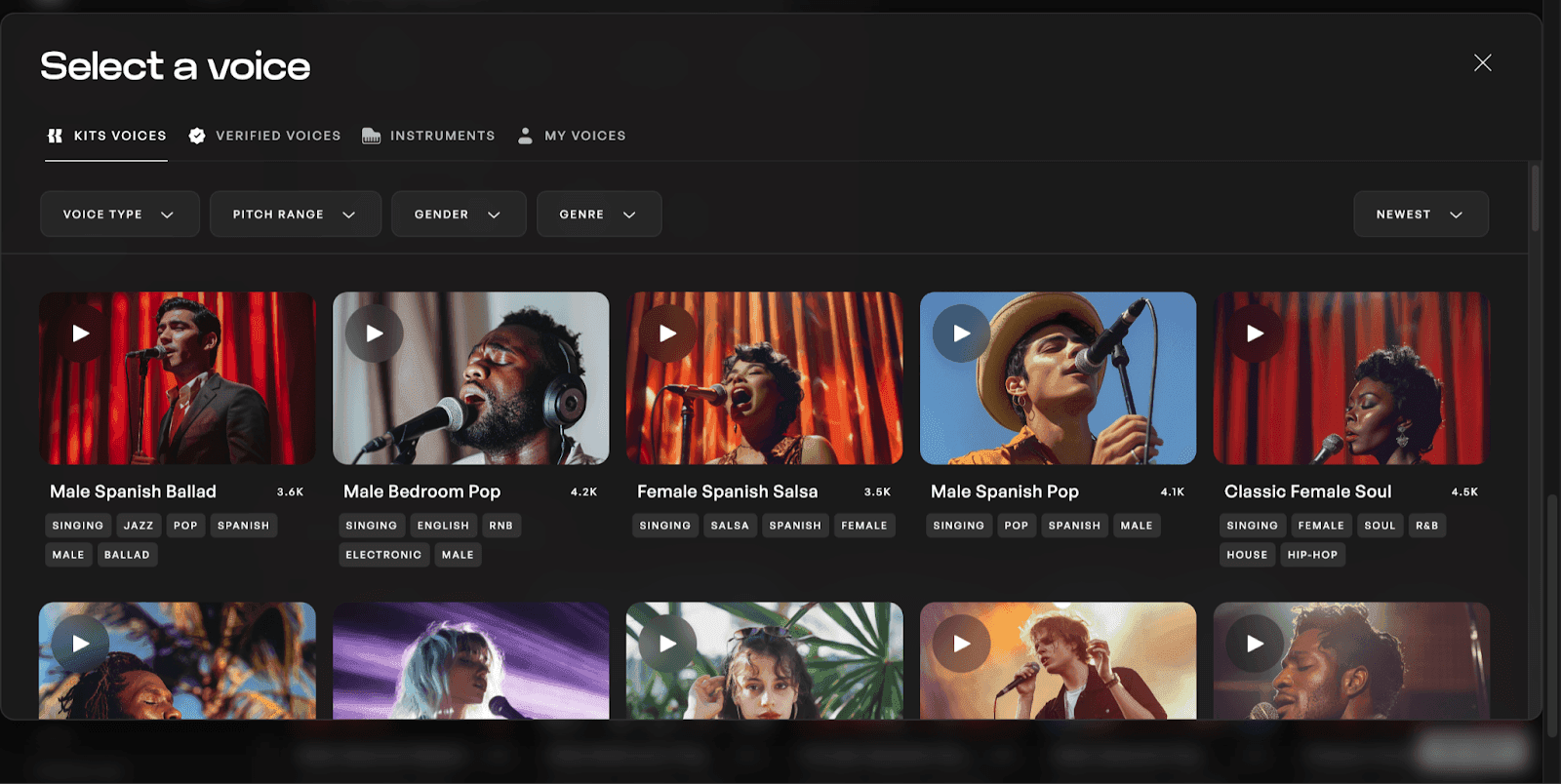
Kits AI’s Convert tool is an extremely powerful and wonderfully simple voice generator. To start, upload isolated audio, a YouTube link (NOTE: Youtube Conversion and Training is unavailable as of October 1st, 2024 due to YouTube API policy changes), or a finished song and let Kits AI extract the lead singer’s voice.
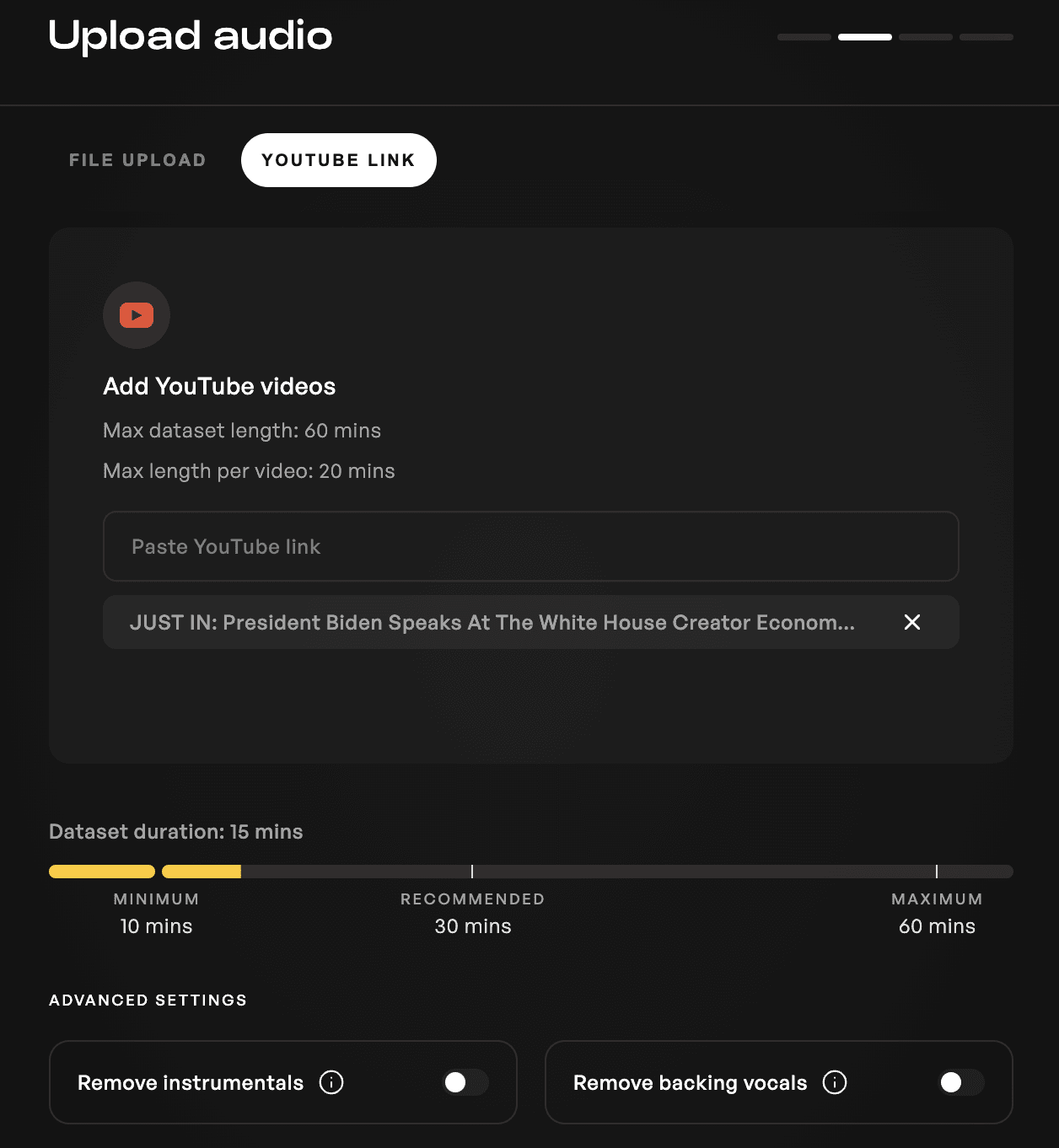
Kits AI has a plethora of options for fine-tuning your conversion:
Pitch Shift: Raise or lower the pitch by up to 24 semitones.
Pitch Correction: Select a key, strength, and smoothness, and AI will make sure you’re singing in tune.
Isolate vocals by removing instrumentals, backing vocals, reverb, and delay.
Accent Strength: Get a thicker accent from the voice model. (Higher levels can cause mispronunciations.)
Volume Blend: Control the balance between the input volume and the model.
Pre-Processing Effects: Cut noise, rumble, and harshness, smooth volume, and EQ before generation.
Post-Processing Effects: Apply compressor, chorus, reverb, and/or delay to your final result.
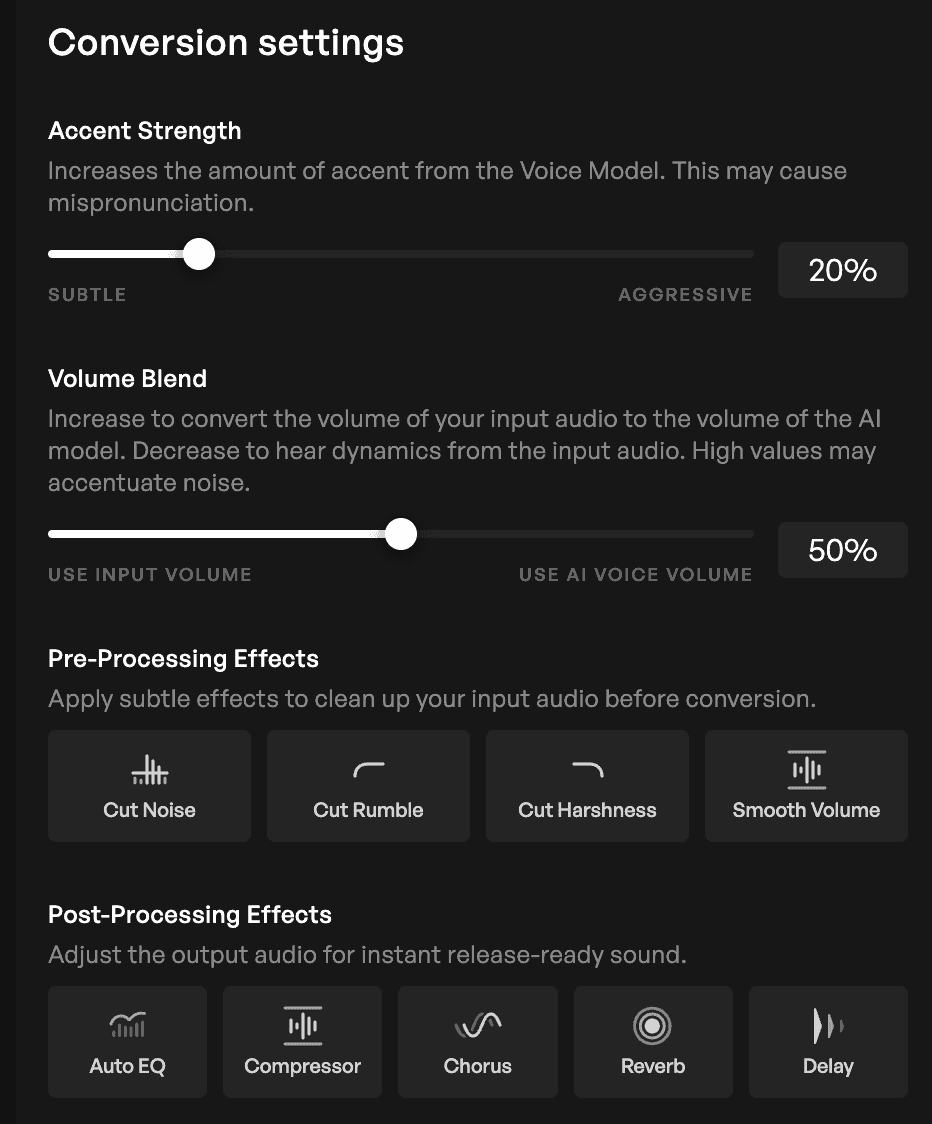
These options allow users to fine tune their vocal conversions, ensuring precise adjustments and greater control over the final output.
And the best part? How it sounds. Kits AI offers the most natural, human conversion results in the industry.
Vocal Isolation for Vocal Tracks
Vocal isolators and stem splitters have existed for a long time. But the results couldn’t compare to what’s possible with today’s AI tools.
AI tools can discreetly fix off-key elements in vocal recordings, transforming poorly sung notes into perfectly tuned performances.
Don’t take our word for it; just ask Paul McCartney. In the short film about the making of the last Beatles song, “Now and Then,” Sir Paul describes how they isolated John Lennon’s vocals from a muddy recording on a low-quality cassette using AI. Paul and Ringo had tried to finish the song for years, but it was not possible without today’s vocal isolation technology.
Kits AI Vocal Remover and Stem Splitter for Music Production
This same technology that stunned The Beatles is now available to you. And it’s easy enough for even the most casual musicians.
These tools excel in fixing pitch with greater accuracy and transparency, producing a more natural sound in the pitch correction process.
The Kits AI Vocal Remover is incredibly simple. Just upload a recording, select whether to extract instrumentals, backing vocals, and/or reverb, and you’re done! You’ll get an incredibly crisp, isolated recording of the lead singer. The Kits AI Stem Splitter works the same way. Just upload a file, and you’ll have perfectly separated files for vocals, guitar, bass, drums, and other instruments.
These tools are great for anyone who makes remixes to quickly access different parts of a song. They’re also great for rappers who want to remove an original vocal and add their own over a beat. Or, use the stem splitter to isolate a difficult instrumental part to learn on your own, or use it to create backing tracks to practice with.
The Future of Music Production with AI-Powered Vocal Processing
The future of music production is poised to be shaped by the continuous evolution of AI-powered vocal processing tools. As AI technology advances, we can expect to see even more sophisticated and intuitive tools that can analyze and correct pitch issues in real-time, generate high-quality vocal tracks from scratch, and create innovative vocal sounds that were previously unimaginable.
Whether you’re a seasoned producer or a beginner player, AI vocal tools can level up your music in unbelievable ways. These tools can save you time, make you more creative, and level up your sound. And with Kits AI starting at just $11.99 per month, there’s nothing stopping you from exploring the wild world of AI vocals.
